- Home
- Leslie Meier
Silver Anniversary Murder Page 11
Silver Anniversary Murder Read online
Page 11
She had some text messages so she checked them, finding mostly ads, which she deleted, and one from Ted. Probably not good news, she guessed, reluctantly opening it. As she expected, he was peeved and it was all her fault. Following the interview, the Bickfords had had second thoughts about her upcoming story portraying their marriage and had asked him to kill it. When he’d objected, they’d asked to read it in advance of publication, which he’d agree to against his better judgment.
Against established policy, too, thought Lucy.
Of course they’d hated it and pressed him not to print it, but when he flatly refused they demanded free ad space, which he agreed to do but realized afterward was probably the motivation for the whole thing. Thanks to her, he’d been taken.
Thanks to your own foolish self, thought Lucy. She tucked a pillow under her head and looked around the little apartment, all hers for a week. City life wasn’t so bad, she thought, trying to decide which of the Lean Cuisine dinners she’d picked up at the bodega to have for supper. She opened the tiny freezer and studied her options, deciding that none of them were very appealing. She considered going out again to the bodega to find something more appetizing, but the thought of stuffing her swollen feet into her running shoes convinced her to settle for the chicken with noodles. The bottle of wine in the fridge caught her eye when she grabbed a package of salad, and she decided to pour herself a glass.
After polishing off her low-cal meal she indulged in a second glass of wine, which turned out to be a respectable sauvignon blanc, and turned on the TV. The owner of the apartment subscribed to premium cable and she was dazzled by the huge number of options, not to mention the rare opportunity of choosing exactly what she wanted to watch. At home, TV viewing was dominated by Bill’s sports and the girls’ reality TV. So tonight she opted for a Scandinavian crime series everyone raved about that she’d been dying to see, intending to binge watch the whole six episodes. She only made it through two, however, before she began to feel sleepy and made up her bed on the futon.
It was recalling the frightening camera shot from under the bed in episode two, the viewpoint of the creepy guy who’d been hiding there, waiting to attack the unsuspecting young woman who was kicking off her bunny slippers, that kept her awake. Of course she’d checked beneath the futon, finding only dust bunnies and an ancient New Yorker magazine, but that didn’t seem to help. Neither did the voices of passersby, the constant sirens, roaring motorcycles, and slammed car doors, all of which kept her on edge. Lying there in the darkness, she fretted about Elizabeth, far away in Paris where terrorists might attack at any moment. Then there was little Patrick, off in Alaska, where polar bears roamed the streets and untamed wilderness was only steps away from his backyard. Sara and Zoe were on her mind, too, since they seemed set on careers, which was fine with her so long as they also settled down with nice husbands who’d keep them safe and provide her with more grandchildren. She knew this was ridiculously old-fashioned of her, and selfish as well, but that was how she felt, deep down, and she was frustrated by her daughters’ lack of interest in finding suitable mates.
She finally did drift off for a few hours, but woke bright and early at her usual six o’clock. There was no reason to get up so early, so she rolled over and tried to go back to sleep, but her internal clock had decided it was time to be up and doing. Deciding to go out and explore the neighborhood, keeping an eye out for a shoe store where she could return later in the day to buy comfortable sandals, she got up.
It was a cool morning that promised to be clear, and the trees dotting the sidewalk still had the springtime look of freshly opened leaves. She had the sidewalk to herself as she walked along, but found she really didn’t have the energy for a long walk, especially since her feet were still somewhat swollen. When she discovered the bodega was already open, with the morning papers stacked on an outside bench made from a plank set on two grubby plastic milk cases, she grabbed a thick New York Times Sunday edition and went inside to pay for it. Coffee was brewing, so she bought a large cup and a huge bagel as well, and went back to the apartment intending to treat herself to a lazy morning.
Lucy had more than a passing interest in the Times; as a reporter herself she was interested in learning as much as she could from the paper that was regarded by many as the gold standard of journalism. She especially admired the obituaries, because they often offered unusual insights about famous people, and also recounted the lives of interesting but lesser known individuals. When she finished the first section, with the news of the day, she turned to the business section, which she knew usually had an interesting couple of pages covering New York real estate and lifestyles. She never got that far, however, because the front page had a story about Jeremy Blake.
According to the story, which was bylined E. L. Haley, the state attorney general was calling off an investigation of alleged condo fraud by Jeremy Blake. The story included allegations that Blake’s company had pressured occupants of rent-stabilized apartments to move so the units could be converted to condos, and had also delayed turning over the management of condominium buildings to the unit owners, thus continuing to collect bloated HOA fees. The AG had given no explanation for the decision, which had outraged some of the condo owners who were quoted in the article. Jeremy Blake himself could not be reached for comment, which amused Lucy.
The reporter’s e-mail address was printed at the end of the article, so Lucy sent a brief e-mail requesting a meeting. She figured a New York Times reporter was probably much too busy to bother with a housewife and part-time, small-town reporter from Maine, but figured it was worth a try. Then she turned to the Arts & Leisure section, looking for something to do that afternoon, and found a notice listing an art show in Soho featuring works by Tito Wilkins, Beth’s second husband.
Aware that Soho was a bit of a trip, and would require the use of her feet, Lucy did some research on her laptop and found a nearby shoe store that opened at eleven a.m. on Sundays. She was there when the door opened, and after commiserating with her over her tired feet, the proprietor sold her a pair of butter-soft sandals with guaranteed arch support. They cost a fortune, but Lucy wasn’t about to quibble.
The new sandals were fantastic, like little foamy clouds beneath her feet, practically carrying her up the subway stairs into the heart of Soho. She wasn’t familiar with the area, which had become gentrified in recent years, but expected to find a quiet, artistic neighborhood with quaint, narrow streets and unusual shops and galleries. The streets were indeed narrow, dating from the early settlement of lower Manhattan, but they were thronged with masses of people who had apparently come from all over the world to shop at high-end designer boutiques like DKNY, Tommy Hilfiger, and Stella McCartney, as well as the numerous vendors selling cheap knock-off scarves and sunglasses from tables on the sidewalk.
Lucy was carried along by the crowd, not exactly sure where she was or where she would find the gallery. She passed a L’Occitane shop selling fancy toiletries and paused, considering going into the crowded store, but someone bumped into her and she figured she’d better keep moving. Passing a tiny French bakery, she realized it was connected to a bistro called Balthazar and she darted inside, hoping to find shelter from the buffeting crowd and maybe a ham sandwich.
Those dreams were dashed when the maître d’ informed her there would be a three-hour wait, and indeed the place was packed with people. No wonder, she thought. It was a bit of Paris right here in New York and she wished she could stay and be served by the waiters in their black jackets and long white aprons. She did spot a sign for TOILETTES and descended to the basement level, just as one did in Paris. The ladies’ room was clean and attended by a small, wizened woman in a black dress, so after washing her hands Lucy gave her a couple of dollars and asked for directions to the gallery.
The directions were spot-on accurate and Lucy soon found the XYZ Gallery, which was located one floor up in a spacious white-walled loft with large windows overlooking the river of humanity
streaming below. An attractive young woman dressed in a black dress with a clunky, artistic, silver necklace was seated at a desk by the door, but merely acknowledged Lucy with a small nod.
Continuing into the exhibit space, Lucy saw a number of large paintings featuring vibrant, bright colors, in an abstract Jackson Pollack style. But after putting on her reading glasses and taking a closer look, she realized what she had taken for abstract shapes and dots were instead body parts and blood. Axes, nooses, guns, and all sorts of knives were worked into the designs, along with bullets and bombs. The pictures were all disturbing, but one with a baby impaled on a bayonet sent her reeling onto a well-placed bench.
This was not what she expected from a man whom Beth had chosen to marry, not at all. Beth had a child when she married Tito Wilkins. Whatever could she have been thinking, exposing little Dante to art like this? Even worse, exposing him to a man who created such disturbing images. What sort of person was Tito? What kind of mind thinks of stuff like this? she wondered, glancing around.
The work didn’t seem to be very popular, as she was the only one in the gallery, apart from the gallerina. It certainly wasn’t anything you’d want to put on your wall, unless you were a sadist or psychotic killer. She supposed it was meant to be a commentary on the violence of modern life, but Lucy felt it was difficult enough to read the newspaper every morning without having to look at graphic depictions of explosions and decapitations. Maybe Tito had changed since his marriage to Beth, thought Lucy, remembering Beth’s accounts of him as an exciting and liberating partner. Maybe he’d become bitter, or overwhelmed by hopelessness, unable to distance himself from the never-ending reports of senseless mass shootings and terrorist attacks.
Shaking her head, she approached the gallerina, who reluctantly put down the smartphone that seemed glued to her hand. “I’d like to contact the artist. I knew him years ago when he was married to a good friend, but I lost track of him when they divorced. Can you give me a phone number? I’d really like to get in touch with him.”
“I’m sorry but that’s not possible. The artist himself asked us to protect his privacy, and when you consider the nature of his work, it’s probably for the best.” She picked up a packet of papers stapled at the top. “This is his bio, if you’re interested.”
“Thank you,” said Lucy. “Have you met him? What is he like these days?”
“He’s really old, very polite, quite reclusive. He was only at the opening for about fifteen minutes, long enough to pose for a photo and shake a few hands.”
“Does his work sell?” asked Lucy.
“Oh, gosh yes. A big rock star was in the other day, and he’s considering several for a new house he just bought in Rhinebeck.”
“Interesting,” said Lucy, preparing to go. “Perhaps you could pass along a message to Tito, from me?” She scribbled her phone number and name on the corner of the top sheet of the bio and ripped it off. “I’d really appreciate it.”
“I send him an e-mail every day. He wants to know when someone is interested in buying a painting. I don’t suppose it would do any harm to mention your interest.”
“No harm, only good,” said Lucy.
Lucy didn’t really have any hope that Tito would contact her, and she wasn’t actually sure if she wanted him to. He might be able to offer some insight into Beth’s death. He might even have been her killer, come to think of it. Those images were really disturbing and unsettling, and Lucy feared they possibly represented a deranged personality, perhaps even prone to violence.
Beth really knew how to pick ’em, she thought, ticking off the whacko phony religious leader Gabe, the fraudster Jeremy, and now the crazy, violent artist. The chiropractor, husband number three, seemed the most normal of the bunch, but that marriage hadn’t lasted either.
Stepping out onto the busy sidewalk again, Lucy decided to head home. She was tired, and she still had the Book Review, Travel, and Sunday Style sections of the Times to read. The subway station was nearby, on the corner, and she descended, hoping for an uncrowded train with plenty of seats. Maybe even one of those benches on the platform would be free and she could sit and rest while waiting.
Once she got through the turnstile, however, and found the platform, she discovered something was amiss. A cluster of people had gathered at one end of the subterranean tunnel and were anxiously looking around, as if waiting for help to arrive. Further along on the platform, she saw several girls in brightly colored, form-fitting track suits yelling insults at each other and pushing and shoving. Then one, the largest, grabbed one of the girls by the hair and dragged her down onto the filthy concrete, pummeling her.
Someone should stop this, thought Lucy, terrified that one or more of the girls would end up on the train track. She knew she couldn’t do it; she was much too small. She looked to the other passengers, counting a couple of families with kids, older women, and one young man whose arm was in a cast, and decided there was no help to be gotten there. Making a quick decision, she dashed up the stairs to the mezzanine containing the turnstiles, ticket machines, and an information booth with an attendant. She pushed her way through the exit, losing her fare, and banged on the thick, protective Plexiglas window to get the man’s attention. When he looked up from his copy of the Daily News she reported the fight, getting a shrug. The attendant did pick up the phone, however, and Lucy hoped, but wasn’t convinced, he was calling the transit police.
There was nothing more she could do, she decided, and she certainly wasn’t going back to the platform. She’d have to pay another fare, for one thing, and she wasn’t about to subject herself to real violence, not after seeing all that painted violence. She climbed the steps to the street and positioned herself on the corner, arm raised to hail a taxi.
Chapter Ten
Sunshine was streaming through the slatted shutters and striping the wall when Lucy woke on Monday morning, feeling refreshed after a good night’s sleep. Maybe she was feeling more comfortable in her temporary digs, maybe it was all the exercise she’d gotten the day before, or maybe it was the fact that she’d had a nice phone call with Sara just before bedtime. Everything was fine at home, she’d learned, except for the fact that they all missed her.
When Lucy popped around the corner to the bodega to get coffee and a fresh bagel, she realized it was a day in a million with a clear blue sky, temperature in the sixties, and a light, fresh breeze. Determined to take advantage of such a fine day, she decided to venture up north to the Bronx and the New York Botanical Garden. She seemed to recall that the garden wasn’t far from Beth’s chiropractor husband Colin Fine’s office, and that hunch was confirmed as she studied a street map while chewing on her warm, buttered bagel. She called his office while walking to the subway and was able to get an early afternoon appointment, which she’d decided was the best way to approach the doctor. She hadn’t made up her mind whether he’d remember her as Beth’s friend, and even if he did there was no guarantee he’d want to meet with her to hash over old times. There was also the fact that she considered him an unlikely, but still possible suspect in Beth’s death, so choosing the office setting seemed the safest option.
But she put all that out of her mind after buying her ticket at the gate and entering the botanical garden, where she wandered through the beautiful grounds, admiring the various blooms and ending up in the rose garden, which was just entering its prime period. The varieties were all labeled and she marveled at each one, often wondering about the names and who exactly were people like Rita Levi-Montalcini and Charles de Mills and why these particular roses were named after them. She was waiting at the tram stop when she saw a little golf cart carrying a bride, complete with long white dress and veil, stop by the rose garden. There the bride, groom, photographer, and assistant all got off and prepared to take formal portraits. Lucy watched this little drama, delighted, until the tram arrived and brought her back to the entrance, where she treated herself to lunch in the café and bought a bar of rose-scented soap in the
gift shop. Then, renewed with fresh optimism, she walked the seven blocks to Dr. Fine’s office.
Lucy had never been to a chiropractor, but she discovered that Dr. Fine’s office was pretty much like every medical office she’d ever visited, with a middle-aged female receptionist who demanded her insurance card and ID in a strong, Brooklyn-accented voice, then gave her a clipboard with a long questionnaire to fill out. The waiting room was crowded and Lucy checked out the other patients before choosing a seat. They were a mixed lot of men and women, some seemingly quite prosperous while others looked as if they were on the other end of the economic scale. Lucy didn’t want to be judgmental or snobbish, but some of those people appeared to need a good wash. She finally seated herself on one of the few empty leatherette armchairs, next to a casually dressed man in sweatpants who was reading the Wall Street Journal, and began to fill in the form. It was quite a thorough inquisition, beginning with name and address, which caused her to pause before putting down the address of the Airbnb. Then she went on to tackle questions about her next of kin, age, and sex, but also her age at the onset of menstruation, obstetrical details such as number and outcome of pregnancies, and even her parents’ causes of death.
She had plenty of time to think about her answers, as the earlier patients were called to the examining room one by one. Some of them didn’t seem to stay very long, while others were gone for quite some time. She tried to determine from their expressions whether or not their treatments had been successful, but couldn’t tell. Some coughed up quite a lot of money for their treatments, usually in cash, which she thought was odd. In her experience, medical offices usually billed for the portion of the bill that wasn’t covered by insurance or a copay.

 Christmas Card Murder
Christmas Card Murder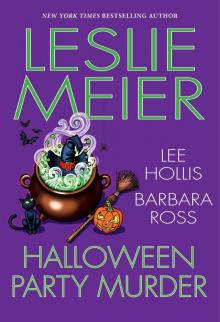 Halloween Party Murder
Halloween Party Murder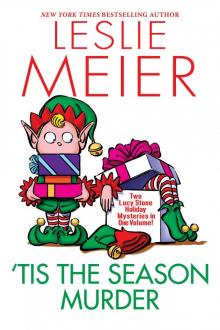 'Tis the Season Murder
'Tis the Season Murder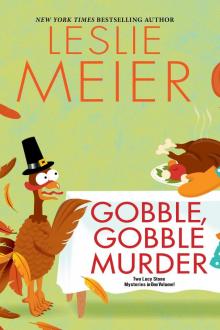 Gobble, Gobble Murder
Gobble, Gobble Murder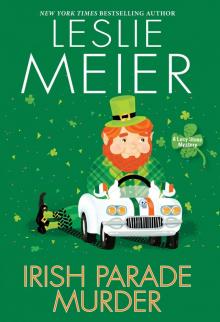 Irish Parade Murder
Irish Parade Murder Bake Sale Murder
Bake Sale Murder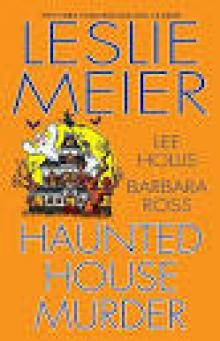 Haunted House Murder
Haunted House Murder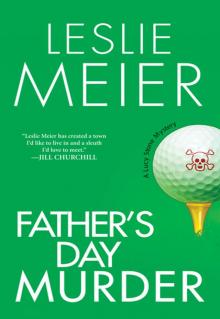 Father’s Day Murder
Father’s Day Murder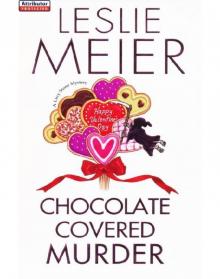 Chocolate Covered Murder
Chocolate Covered Murder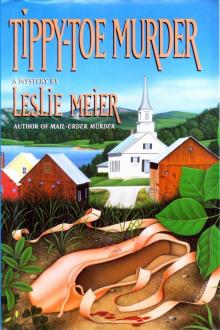 Tippy Toe Murder
Tippy Toe Murder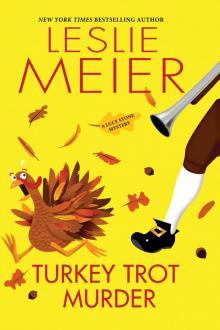 Turkey Trot Murder
Turkey Trot Murder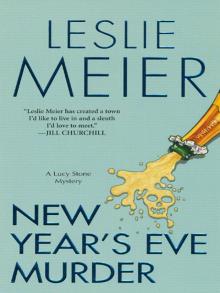 New Year's Eve Murder
New Year's Eve Murder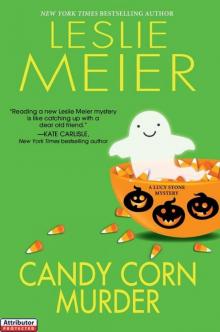 Candy Corn Murder
Candy Corn Murder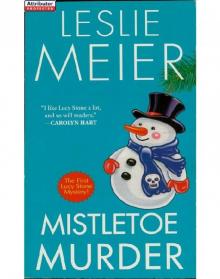 Mistletoe Murder
Mistletoe Murder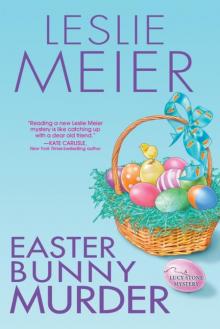 LStone 20 - Easter Bunny Murder
LStone 20 - Easter Bunny Murder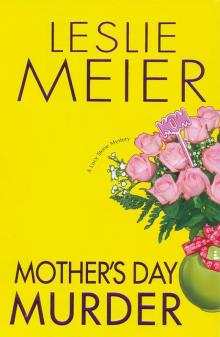 Mother's Day Murder
Mother's Day Murder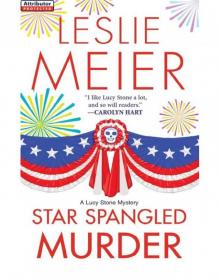 Star Spangled Murder
Star Spangled Murder Silver Anniversary Murder
Silver Anniversary Murder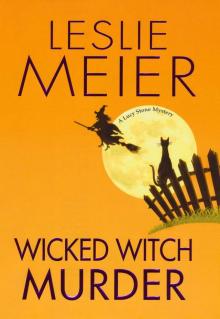 Wicked Witch Murder
Wicked Witch Murder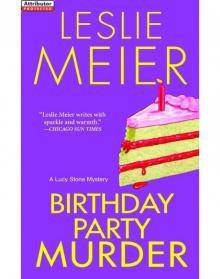 Birthday Party Murder
Birthday Party Murder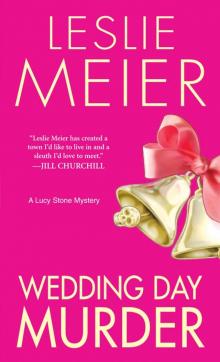 Wedding Day Murder
Wedding Day Murder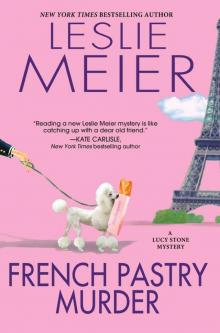 French Pastry Murder
French Pastry Murder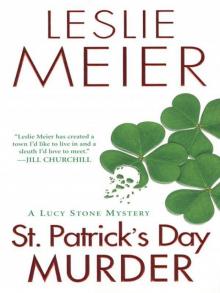 St. Patrick's Day Murder
St. Patrick's Day Murder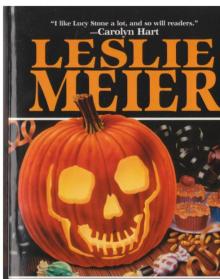 Trick or Treat Murder
Trick or Treat Murder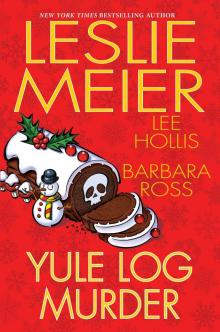 Yule Log Murder
Yule Log Murder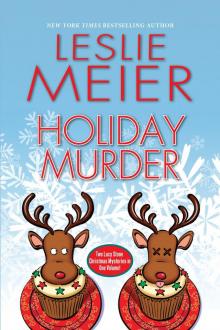 Holiday Murder
Holiday Murder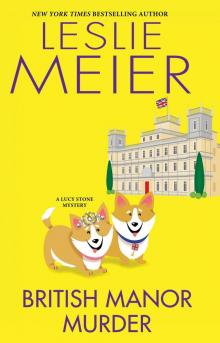 British Manor Murder
British Manor Murder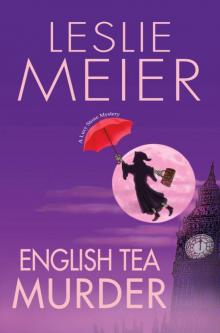 English Tea Murder
English Tea Murder